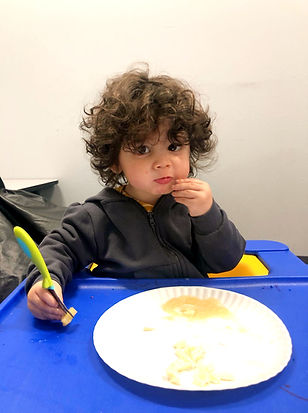Feeding Therapy
Why won't my child eat?
Feeding is the complex interactions between the selection of food, ingestion, and regulation as well as the engagement between the child, caregiver, and environment.
Feeding difficulties tend to result from a multitude of factors: sensory, oral motor, medical, behavioral, social, and environmental.
Due to the complexity of feeding, an advanced occupational or speech-language therapist must examine all components: sensory, oral motor, medical, behavioral, and social/environmental.
Components of Feeding
Sensory
Feeding is a physical task that requires simultaneous coordination of all sensory systems:
visual, auditory, gustatory, tactile, olfactory, vestibular, kinesthetic and proprioceptive.
Oral Motor
Swallowing is considered one of the most complex physical activities humans engage in because it requires all of the body’s organ systems including muscular and skeletal. Oral Motor skills consist of the structures and functions that allow the process of eating and swallowing.
Medical
Feeding problems are more common in children with developmental delays or disabilities, autism, diabetes, and other conditions.
Behavioral
As children mature, feeding behaviors are increasingly influenced by events, consequences, and social contingencies. Unpleasant feeding events could highly influence the way a child interacts with others and foods.
Environmental
Feeding is essential to human survival, but it is also a form of social interaction which is influenced by culture, food choices, rituals around meals, and its social meaning




More than 1 in 37 children
under the age of 5 are affected by pediatric feeding disorders in the United States each year.
(Feeding Matters)
An infant and toddler’s anatomy and physiology is much different than an older child and adults, thus impacting how they manipulate foods.

Meet our Therapists!
At Beelieve Pediatric Therapy, our team of exceptionally qualified physical, occupational, and speech therapists is united by a shared passion: helping kids BEE the BEST they can BEE through compassionate, individualized care.
Guided by our iCREATE values—Integrity, Compassion, Respect, Empowerment, Advocacy, Teamwork, and Elevation—our therapists bring both clinical excellence and heart to every session.
We partner with families to provide care that is individualized, meaningful, and rooted in connection. Whether through play, movement, or communication, we create a space where children feel seen, capable, and celebrated—and we’re honored to BEE part of their journey.

Depending on your child's needs, they may be seen by a Speech or Occupational Therapist to address feeding concerns. Our team has a variety of trainings, certifications, and experiences that will help your child BEE the best they can BEE!




